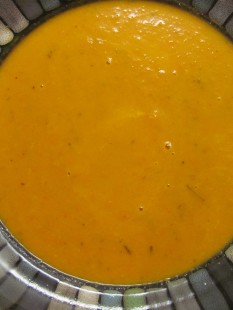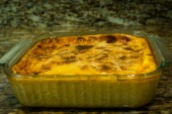This piece first appeared in the December 2014 issue of India Currents magazine. I’d love to hear your childhood food memories! Share? 🙂
~
Among my earliest childhood memories is a shot of thrill up my spine on hearing a certain raspy, faraway voice calling “Paaplet! Kolmi! Bombil-waleeeaaay!”
That was Moti, our family fisherwoman for three generations, hawking the just-caught contents of her woven basket to a lane of Parsis willing to pay top rupee for their palates. Much hubbub would follow, as someone, typically a domestic or child tall enough to reach the window, was sent to wave her down. “Yete!” she’d screech, with all the decorum of a hurricane ripping through an island, and begin her ascent to our top-floor home, green glass bangles and thumping gait announcing her presence long before she huffingly-pufflingly made it.
Moti smelled of scales and salt and the sea, odors I came to associate with happiness. In a Parsi child’s life, especially one stereotypically expected to manage her own kitchen in adulthood, an education in fish is vital. The lessons of laal pani versus safed pani, and using your finger to scoop under the gills to check for freshness are Fish Purchasing 101 tips. The nose is your savviest instrument, and one as undiscerning as mine is a serious liability. Then there is a banquet of bliss to choose from—all those varieties of fresh and saltwater fish, seasonal and available the whole year through—bangra (mackerel) and raawas (salmon), boi (mullet marine) and boomla (bombay duck), and the thrill of discovering bonus gharab (roe) in one of your chosen future meals.
It is a messy business, the selection of fish. Not for those who aren’t accustomed to ooze and blood and scales. Its parts callously lopped into diagonal chunks, its silver-grey body glistening enticingly, a pre-purchase fish is a thing of beauty. It is here that I realize the staggering power of social conditioning, for a joyous childhood ritual that entails a dead creature’s guts can only be that. Or perhaps it is a lesson in focusing on the end result: the perfect, well-seasoned accompaniment to a meal of dhandar. H.e.a.v.e.n.
A trusting rapport with your machhiwali is expected to be one of life’s most enduring relationships. And when she moves on to a better place, where crispy-fried boomlas (I’ve mentioned them three times already in 300 words, can you tell they’re a favorite?) are dished hot and fresh by harp-strumming cherubs, you know better than to mess with the line of succession—her daughter or niece will become your supplier. Our Lady of Piscine Perfection is now Moti’s niece Tanuja, who has discarded the colorful nauvaris of her Koli roots and the ginormous beaded nath of Moti’s era, but thankfully, none of the accent or the mannerisms that we almost expect of our fisherwomen.
It is a centuries-old communication, this unique and frequently amusing haggling between housecoat-clad Gujarati speakers and the shrill and shrewd sellers of fish. Odd words fly in Marathi, exclamations peak like stiff egg whites and many an eyebrow does a Prabhu Deva, with flung arms for company. Accusations of looting and starving little children are routinely hurled, as both parties bemoan a time when the catch was fresher, prices cheaper, and their respective communities were pretty much the only inhabitants of Bombay, apart from the Sahibs.
The last time I was in Bombay, I partook of this ritual gladly. From carrying out round thaals (plates) to pile the carefully-selected purchase on, to washing each piece carefully under running water, scrubbing the scales and poking fingers into icky crevices, anointing each piece with flour and salt, rubbing the mixture in, letting it sit 10 minutes, and then washing everything one more time, I was never more closely connected to my bloodline. It came to me easily, though it was the first time I had actually done it from beginning to end. I was a natural, I felt at ease. I had learned my lessons well from years of bearing witness.
Here in America, the process is supremely sanitized. Cleaned, deboned and ready to cook, artfully-arranged slices are put on display, eliminating consumer participation in so many crucial steps of the acquisition process. It reminds me of a time when a friend confessed she hated having a C-Section. “I feel cheated of a natural birth,” she had said, “I know I should be grateful for a healthy delivery, but I can’t help feeling duped.” Oddly enough, this is exactly how I feel walking into my neighborhood Safeway or Chinese supermarket—clinical, disconnected, disappointingly sterile.
I can imagine how hard this must be for vegetarians to comprehend. They are as much products of their socialization as I am of mine, but the human relationship to food is an intimate one, and in a gourmand community like mine, it includes passion, devotion, and obsession. Having incorporated so many elements not quite our own on the long road from religious refugees to a privileged, respected, and still relatively unknown minority, our cuisine and its methods are understandably something we Parsis are immensely proud of. (So if you have considered offering a thoughtless suggestion like “Why don’t you turn vegetarian?” please know we’re already debating how much spice to marinate your brain in for those breakfast cutlets tomorrow.)
From what I’ve learned in my score and 15 years on god’s bounteous earth, it is that life has a way of presenting precisely what you fight. So a fishless future isn’t the worst fate that can befall me. (I’m so glad you can’t see my dilated pupils and crossed fingers right now.) But I also know that I am the honored carrier of the DNA of a long line of fin fans, and this—both the process and the end result— is one of my life’s joys.













Vox populi